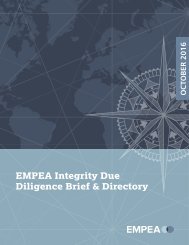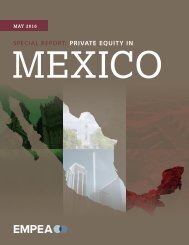You also want an ePaper? Increase the reach of your titles
YUMPU automatically turns print PDFs into web optimized ePapers that Google loves.
in absolute terms, or relative to the non-poor to decrease<br />
inequality. 42 As noted by the Organisation for Economic Cooperation<br />
and Development (OECD), “[d]evloping countries<br />
with similar rates <strong>of</strong> economic growth have experienced<br />
quite different levels <strong>of</strong> economic poverty reduction, due to<br />
initial conditions and whether growth occurs in areas and<br />
sectors where the poor live and are economically active.” 43<br />
Because job creation driven by PE domiciliation primarily<br />
requires skilled labour—such as accountants, lawyers, fund<br />
administrators—and focuses on a small subset <strong>of</strong> financial<br />
activity (PE and venture capital), it largely bars the poor<br />
from participating in and benefiting from the growth. While<br />
the development <strong>of</strong> a skilled labour force could indirectly<br />
benefit the poor through increased remittances or unskilled<br />
jobs, we suggest that the extent would be modest.<br />
One may suggest onshore financial centres have the<br />
potential advantage <strong>of</strong> being near larger pools <strong>of</strong> capital<br />
than <strong>of</strong>fshore centres. Funds, however, typically have<br />
both an onshore component for domestic investors and an<br />
<strong>of</strong>fshore component for foreign investors. While domestic<br />
investors <strong>of</strong>ten cannot escape regulatory and tax issues by<br />
going <strong>of</strong>fshore, international investors typically favour the<br />
<strong>of</strong>fshore vehicles for their regulatory and tax advantages.<br />
In addition, the speed with which global capital now moves<br />
in many cases reduces the impact <strong>of</strong> geographic barriers<br />
between limited and general partners.<br />
Another question must address the feasibility <strong>of</strong> creating<br />
an onshore financial hub for PE in Africa. In the following<br />
section, we explore how Mauritius came to its present<br />
dominance as a PE domicile and the strategies another<br />
country would have to pursue to compete with it.<br />
5. THE SPECIAL CASE<br />
OF OFFSHORE FINANCIAL<br />
CENTRES – MINI-CASE:<br />
AFRICA-FOCUSSED FUNDS<br />
AND MAURITIUS<br />
In this section, we focus on the specific decision drivers<br />
for Africa-focussed PE funds. Experts suggest Mauritius is<br />
the domicile <strong>of</strong> choice for African PE funds, 44 and thereby<br />
serves as a fitting case study to understand the incentives<br />
behind domicile decisions.<br />
5.1. Drivers for Mauritius Domiciliation for<br />
Africa-focussed PE Funds<br />
In a review <strong>of</strong> practitioner opinions, we identify a number<br />
<strong>of</strong> key attributes leading private equity fund managers<br />
to domicile Africa-focussed funds in Mauritius. These<br />
include tax, legal, and financial incentives, geography and<br />
organisational memberships, political stability, and local<br />
pr<strong>of</strong>essional service providers. We discuss each below.<br />
1. Tax incentives<br />
In response to a surge in foreign direct investment (FDI)<br />
investment from Mauritius-domiciled investment funds<br />
in 2010, Trident Trust—admittedly not the most objective<br />
source because it <strong>of</strong>fers fund administration services there—<br />
examined the PE industry’s attraction to the jurisdiction.<br />
The study found that PE funds capitalised on Mauritius’s<br />
own low tax environment and its network <strong>of</strong> DTAAs (Double<br />
Taxation Avoidance Agreements):<br />
Mauritius is party to 34 [note: 39 have entered into force<br />
to date 45 ] tax treaties. Most <strong>of</strong> these treaties exempt<br />
from capital gains tax the pr<strong>of</strong>it realised on the sale<br />
<strong>of</strong> shares <strong>of</strong> companies based in a treaty partner – a<br />
key private equity consideration. In addition, many <strong>of</strong><br />
these treaties also exempt—or apply a lower rate—<br />
from withholding tax payments <strong>of</strong> interest, dividends<br />
and royalties. A further attraction for private equity is<br />
that Mauritius does not itself have a capital gains tax<br />
and does not impose a withholding tax on dividends<br />
paid by Mauritius companies to foreign shareholders.<br />
Funds are subject to a local 3% [effective] tax [rate] on<br />
ordinary income. 46<br />
Most other African countries typically levy substantial<br />
withholding taxes on dividends paid to nonresidents<br />
(generally between 10% and 20%) and also impose capital<br />
gains taxes at a rate between 30% and 35%. As a result,<br />
Mauritius-domiciled Africa-focussed funds can create<br />
material tax savings. 47<br />
2. Other financial / legal incentives<br />
Mauritius also reduces investment risks associated<br />
with Africa-focussed funds through its African network<br />
<strong>of</strong> Investment Promotion and Protection Agreements<br />
(IPPAs). 48 Broadly speaking, IPPAs are bilateral treaties<br />
between governments designed to attract investment in<br />
each other’s territory. IPPAs in Mauritius typically give<br />
<strong>Conduits</strong> <strong>of</strong> <strong>Capital</strong> – Onshore Financial Centres and Their Relevance to African Private Equity<br />
| 57





